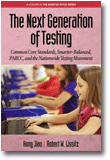
The Next Generation of Testing
Common Core Standards, Smarter‐Balanced, PARCC, and the Nationwide Testing Movement
Edited by:
Hong Jiao, University of Maryland
Robert W. Lissitz, University of Maryland
A volume in the series: The MARCES Book Series. Editor(s): Hong Jiao, University of Maryland. Robert W. Lissitz, University of Maryland.
Published 2015
The Race To The Top (RTTP) federal education policy fostered a new generation of state tests. This policy advocated adopting common core standards which set a higher level of learning targets for students in the US K‐12 education. These standards are intended to assess higher order thinking skills and prepare students ready for college and career. In the meantime, they are aligned with those for international assessments which keep US students abreast of their international peers. Furthermore, the new generation of state tests requires the use of technology enhanced items to align student assessments with student learning environment. Computer technology is indispensable to accomplish this goal. Computer based tests related to common core standards are different from previous state computer based tests in two important aspects, one is that the current version requires accurate assessment of students along all ability levels and the other is that it promotes the use of an efficient test delivery system, essentially the use of computerized adaptive assessment in K‐12 state testing programs. In addition to providing summative information about student learning, the new common core tests add formative assessment component in the whole assessment system to provide timely feedback to students and teachers during the process of student learning and teacher instruction. As with its predecessor, the new assessment policy also holds teachers and schools accountable for student learning.
With the requirements by the new federal education policy, states formed two consortia: Partnership for Assessment of Readiness for College and Careers (PARCC) and Smarter‐Balanced Assessment Consortium (SBAC) to develop assessments in alignment with the new common core standards. This book is based on the presentations made at the Thirteenth Annual Maryland Assessment Research Center’s Conference on “The Next Generation of Testing: Common Core Standards, Smarter‐Balanced, PARCC, and the Nationwide Testing Movement”. Experts from the consortia and nationwide overviewed the intention, history and the current status of this nationwide testing movement. Item development, test design, and transition from old state tests to the new consortia tests are discussed. Test scoring and reporting are specially highlighted in the book. The challenges related to standard setting for the new test, especially in the CAT environment and linking performance standards from state tests with consortium tests were explored. The issues of utilizing the consortium test results to evaluate students’ college and career readiness is another topic addressed in the book. The last chapters address the critical issue of validity in the new generation of state testing programs.
Overall, this book presents the latest status of the development of the two consortium assessment systems. It addresses the most challenging issues related to the next generation of state testing programs including development of innovative items assessing higher order thinking skills, scoring of such items, standard setting and linkage with the old state specific standards, and validity issues. This edited book provides a very good source of information related to the consortium tests based on the common core standards.
CONTENTS
1. How we got to where we are: evolving policy demands for the next generation assessments, Lauress L. Wise, HumRRO. 2. Overview, intention, history and where we are now, Martha McCall, Smarter-Balanced Assessment Consortium. 3. PARCC as a case study in understanding the design of large-scale assessment in the era of common core state standards, Bonnie A. Hain and Carrie Piper, PARCC Inc. 4. Principled Design for Efficacy: Design and Development for the Next Generation of Assessments, Paul D. Nichols, Steve Ferrara, and Emily Lai, Pearson. 5. The Role of Machine Scoring in Summative and Formative Assessment, Mark D. Shermis, University of Houston-Clear Lake. 6. Methods for Monitoring and Document Rating Quality, Edward W. Wolfe and Tian Song, Pearson. 7. State of the Art Standard Setting for State of the Art Assessments, Luz Bay, The College Board. 8. Standard Setting on Planet NextGen, Gary Skaggs, Virginia Tech. 9. A Profile Approach to Determining College and Career Readiness, David T. Conley, University of Oregon. 10. Outline of Smarter Balanced Validity Agenda, Martha McCall, Smarter Balanced Assessment Consortium. 11. A Theory of Action for Test Validation, Steve Sireci, University of Massachusetts, Amherst. 12. Empirical and Procedural Validity Evidence in Development and Implementation of PARCC Assessments, Enis Dogan, Jeffrey B. Hauger, and Casey Maliszewski, PARCC, Inc.
-
Paperback9781681233079
Web price: $45.04 (Reg. 52.99)
-
Hardcover9781681233086
Web price: $80.74 (Reg. 94.99)
- eBook9781681233093

- EDU000000 - EDUCATION: General
- EDU037000 - EDUCATION: Research
- EDU011000 - EDUCATION: Evaluation & Assessment
-
 Application of Artificial Intelligence to Assessment
Application of Artificial Intelligence to Assessment
-
 Data Analytics and Psychometrics
Informing Assessment Practices
Data Analytics and Psychometrics
Informing Assessment Practices
-
 Enhancing Effective Instruction and Learning Using Assessment Data
Enhancing Effective Instruction and Learning Using Assessment Data
-
 Innovative Psychometric Modeling and Methods
Innovative Psychometric Modeling and Methods
-
 Machine Learning, Natural Language Processing, and Psychometrics
Machine Learning, Natural Language Processing, and Psychometrics
-
 Technology Enhanced Innovative Assessment
Development, Modeling, and Scoring From an Interdisciplinary Perspective
Technology Enhanced Innovative Assessment
Development, Modeling, and Scoring From an Interdisciplinary Perspective
-
 Test Fairness in the New Generation of Large‐Scale Assessment
Test Fairness in the New Generation of Large‐Scale Assessment

